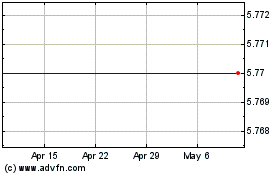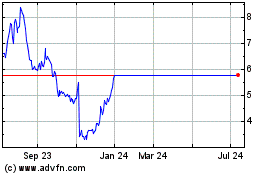The safety of junk debt issued by cable, telecom and satellite
giants is questioned
By Matt Wirz
This article is being republished as part of our daily
reproduction of WSJ.com articles that also appeared in the U.S.
print edition of The Wall Street Journal (May 9, 2018).
The consumer stampede to streaming media from traditional
broadcasters is claiming an unexpected victim: high-yield bond
investors.
Telecommunications, cable and satellite companies have borrowed
hundreds of billions of dollars in junk debt to build networks that
would allow them to dominate their markets for decades to come.
The proliferation of internet-based providers is upending that
expectation, forcing investors to question the safety of bonds they
bought from companies such as satellite broadcaster Dish Network
Corp., cable giant Charter Communications Inc. and landline
telecommunications company Frontier Communications Corp.
Dish, founded by satellite tycoon Charlie Ergen, may be the
canary in the coal mine of the new technological landscape.
Junk-bond investors have lent his companies more than $30 billion
over the past 25 years, according to data from Dealogic,
bankrolling Mr. Ergen's construction of a satellite constellation
and, more recently, his buying spree of wireless spectrum. Now they
are dumping Dish bonds and buying record amounts of derivatives
that insure against a default by the company, fearing that the
industry's rapid evolution is outpacing Mr. Ergen's business
strategy.
Although most cable and telecommunications bond prices have
declined moderately, Dish bonds have lost about one-quarter of
their value in the past year, pushing yields above 9% from about
6%. Higher yields for companies rated below investment grade
concern investors because such firms typically rely on new bond
sales to pay back debt.
Cord-cutting -- as the consumer shift from cable-TV
subscriptions toward streaming services is known -- is particularly
worrying for high-yield bond funds because technology, media and
telecommunications, or TMT, companies comprise about one-quarter of
the $1.25 trillion junk-bond market, according to the ICE BofAML
U.S. high-yield index.
That means one out of every four dollars invested by the average
high-yield bond investor goes to a company susceptible to changing
digital-media consumer behavior. The media component of the index
has lost about 1.33% this year, compared with a 0.38% loss for the
entire index.
"The level of cord-cutting is accelerating," said Jared Feeney a
cable and media bond analyst for Neuberger Berman Group, which
manages $41 billion of high-yield bond investments. Cable companies
such as Charter can offset defecting subscribers with broadband
internet sales, but the first quarter of the year brought
unexpectedly low revenue from video subscriptions and video
advertisement sales across the industry, he said.
High-yield bonds and media and telecommunications companies grew
up together in the 1990s in a largely symbiotic relationship.
Innovation and deregulation spurred the creation of dozens of new
satellite, cable and telecommunications companies whose founders
turned to the nascent junk-debt market for capital. Some grew
steadily and rewarded stock and bond investors, but many, such as
WorldCom Inc. and Global Crossing Inc., failed spectacularly in the
early 2000s, when they ran out of money before reaching
profitability and used fraudulent accounting to mask losses.
Defaults are low right now in telecommunications and media
bonds, and some companies that offer broadband and wireless access
actually benefit from the move toward streaming media.
Investors are also more eager to purchase high-yield bonds than
most forms of debt because they are less sensitive to expected
moves by the Federal Reserve to fight inflation by raising interest
rates, which pushes down prices of almost all bonds.
Signs of cord-cutting trouble emerged last year when wireline
companies, including CenturyLink Inc. and Frontier Communications,
that deliver telecommunications over land lines reported
faster-than-expected sales declines and their bond prices dropped.
The cost of credit- default swaps, or CDS, insuring $10 million
Frontier bonds has risen to $2.5 million from about $1.5 million a
year ago, according to data from IHS Markit. The company has about
$18 billion of bonds and loans outstanding in December, according
to its annual report.
The selling expanded to cable and satellite broadcasters such as
Charter and Dish this year as it grew apparent that their customers
are also abandoning them sooner than expected for internet-based
alternatives like Netflix Inc. and Amazon.com Inc. Rapid change
also spurred a wave of consolidation, from AT&T Inc.'s deal to
buy Time Warner Inc. to Sprint Corp. and T-Mobile US Inc.
attempting to combine for the third time in four years..
AT&T, which has an investment-grade credit rating, has been
hurt because it owns satellite-television operator DirecTV, which
like Dish is losing customers to streaming competitors. Satellite
broadcasters are especially sensitive to streaming-video
competitors because they can't sell broadband services to offset
subscriber defections.
Mr. Ergen, who still controls Dish, has outlasted numerous
satellite rivals such as cellular-phone magnate Craig McCaw and
former hedge-fund manager Philip Falcone. He foresaw the decay of
satellite video and began buying a large patchwork of wireless
network licenses more than a decade ago to help transition Dish to
the wireless broadband age.
A spokesman for Dish declined to comment. The company Tuesday
reported a 6% revenue drop for the first quarter caused by loss of
satellite-television customers.
Stock and debt investors backed Mr. Ergen through the decades in
part because he perennially explored selling the company, and its
wireless licenses, to larger companies like DirecTV, AT&T,
T-Mobile US and technology firm Amazon that could give Dish growth
and security. .But as mergers sweep the industry, Dish has been
left out and bondholders are worried Mr. Ergen will wait too long
and run out of cash before he can realize the long-awaited merger
that will transform his company.
"I think the chances of a deal are pretty low," said Neil
Bizily, a bond analyst for Thrivent Financial, an asset manager
with $6 billion of high-yield bonds and loans. Thrivent has sold
out of all Dish bonds, even though the company comprises about 1%
of the index most high-yield bond investors measure themselves
against, he said.
Some of Dish's $16 billion of bonds traded Tuesday at around 82
cents on the dollar, and Dish credit-default swaps were the most
heavily traded high-yield contract in the default derivatives
market over the past three months, a CDS trader said. The price of
insuring $10 million Dish bonds has about doubled this year to
$692,000, according to IHS Markit, and the value of contracts
outstanding has jumped to $5.2 billion from about $3.6 billion over
that period, according to DTCC Data Services.
Write to Matt Wirz at matthieu.wirz@wsj.com
(END) Dow Jones Newswires
May 09, 2018 02:47 ET (06:47 GMT)
Copyright (c) 2018 Dow Jones & Company, Inc.
DISH Network (NASDAQ:DISH)
Historical Stock Chart
From Mar 2024 to Apr 2024

DISH Network (NASDAQ:DISH)
Historical Stock Chart
From Apr 2023 to Apr 2024
